Can dogs eat tomatoes?
Many dog parents choose to add vegetables and fruits to their animals’ diets. After all, they provide a wealth of healthy vitamins and minerals and phytonutrients that are great for health and longevity. But are tomatoes on the list of yes veggies?
We sat down (virtually) with Canine Nutritionist Sarah Griffiths to get her take on this commonly asked question.
But first – aren’t tomatoes fruits? Technically, yes, tomatoes are fruits, but most nutritionists consider them vegetables (pumpkins and green beans are the same), so we’re going that route.
Can Dogs Eat Tomatoes?
Are tomatoes good for dogs? Ripened tomatoes in small amounts are ok, but adding in this food as part of the regular diet isn’t recommended. The main reason? Tomatoes are categorized as part of the nightshade or Solanaceae family. Yes, I know that in itself sounds scary, but it’s just a plant family!
That said, plants from the nightshade family contain a chemical compound called solanine. It can be toxic to dogs in large amounts. Solanine is primarily found in the stems and the leaves of the plant, but also in green tomatoes. As tomatoes ripen, the solanine levels decrease but still could be an issue if you’re feeding a lot of tomatoes.
Solanine toxicity is rare but if an animal eats too much of this chemical it can result in severe gastro-intestinal upset including vomiting and diarrhea.
Other nightshade vegetables include things like eggplant, peppers, even white potatoes. Garlic and mushrooms though, are not – this is a common misconception I hear a lot.
Are There Benefits of Veggies and Fruit in the Diet?
When we’re thinking species-appropriate nutrition, it’s good to keep in mind which vegetables and fruits would be accessible to dogs in nature. This includes things like grasses, roots, bark, and berries. A wild dog (or a dog’s ancestors, wolves), would easily come across these on their daily rounds, or consume them which the stomach contents of their prey.
That being said, a number of other veggies can provide a wealth of nutrition too. Rotational feeding of fruit and vegetables is the best way to get a variety of nutrients into your dog.
Here’s the YES and NO lists for veg:
Yes Veggies:
- Swiss chard
- Wheat grass
- Microgreens
- Sprouts
- Dandelion leaf and root
- Mustard greens
- Arugula
- Parsley
- Cilantro
- Cucumber
- Spinach
- Broccoli
- Kale
- Beets
- Yam
- Winter squash
- Parsnip
- Jicama
- Carrot
Note: Many of you may have heard that carrots, beets, yams and other roots can be high is sugar but when fed in a raw/blended format, they actually contain beneficial fibres (similar to tree bark) that counter-act glucose uptake! Your dog doesn’t just eat sticks for fun. They instinctively eat sticks and bark for the fibre!
No Veggies:
- Eggplant
- White potatoes
- Bell peppers
- Hot peppers
- Corn
- Lentils
Note: Adding grains and legumes to your pet’s diet increases the risk of harmful herbicide consumption (eg. Glyphosate AKA Round-Up). Legumes can also change the amino acid profile of the food which may be connected to diet-induced dilated cardiomyopathy in dogs.
What About Fruits?
Fruits that wild canids would find in nature include:
- Apples
- Pears
- Blueberries
- Huckleberries
- Blackberries
These foods are packed with antioxidants and also contain beneficial pre-biotic fibres. Apples and pears are often consumed in a partially fermented state, adding access to living, naturally-occurring probiotic strains (this is where you can think of adding raw apple cider vinegar to the diet).
Note: if your pet is struggling with yeast issues, you may wish to omit the fruits while you are sorting it out as the natural sugars can contribute to yeast growth in very unstable cases.
Can Dogs Eat Tomatoes? Final Thoughts
So, can dogs eat tomatoes? Technically, yes – as long as they’re ripe, and in small amounts. That said, there are plenty of other vegetables that pack a nutritious punch that you don’t have to worry about. Perhaps keep the tomatoes for your own salads and salsas.
Thanks to Sarah for taking the time to explain this to us!!












